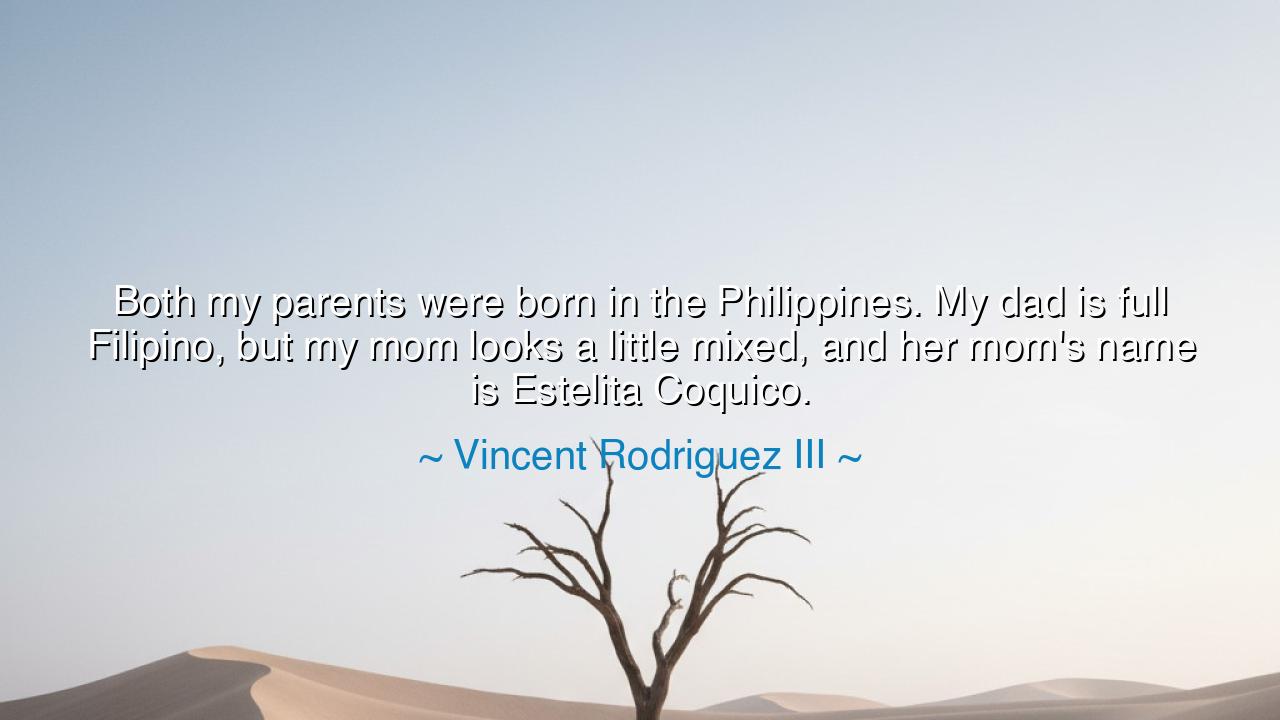
Both my parents were born in the Philippines. My dad is full
Both my parents were born in the Philippines. My dad is full Filipino, but my mom looks a little mixed, and her mom's name is Estelita Coquico.






In the words of Vincent Rodriguez III, “Both my parents were born in the Philippines. My dad is full Filipino, but my mom looks a little mixed, and her mom’s name is Estelita Coquico.” Though simple, these words carry within them the quiet majesty of heritage, identity, and ancestral remembrance. Beneath their humble rhythm beats the pulse of generations, the echo of islands, oceans, and the countless footsteps of those who came before. This is not merely a statement of family — it is an invocation of origin, a song of belonging that reminds us that we are all threads woven from the loom of our ancestors.
The Philippines, a land of a thousand islands kissed by the sea, has long been a meeting place of worlds — Malay, Chinese, Spanish, American. Within its people flow the mingled rivers of history, conquest, and love. To say, as Vincent does, that one’s father is “full Filipino” and one’s mother “a little mixed” is to acknowledge this living mosaic. The Filipino blood is never singular; it is a tapestry of resilience, adaptation, and grace. Every name, like Estelita Coquico, carries stories of courage — of a woman who lived, perhaps through hardship, through laughter, through love, and gave her descendants not just life, but legacy.
In this remembrance lies a profound truth: that to know oneself, one must know those who came before. A man who remembers his grandmother’s name honors more than blood — he honors the unseen hands that shaped his destiny. Like ancient storytellers by the fire, our ancestors speak through memory. And when their names are uttered, they awaken — whispering wisdom into the hearts of the living. This is why such words matter. They are not idle recollections; they are acts of reverence.
Consider the story of José Rizal, the great son of the Philippines. He, too, drew power from remembering his lineage — from the soil of his homeland, from the mothers and fathers who labored under foreign rule but never forgot their worth. Rizal’s strength was not born from rebellion alone, but from remembrance — from knowing who he was and why he must stand. His blood, like Vincent’s, carried the mixed history of a people both conquered and unconquerable. It was in this awareness of ancestry that his courage bloomed, and through him, an entire nation learned to say, “We are our forebears’ dream made flesh.”
There is something sacred in the act of naming. When Vincent speaks the name Estelita Coquico, he is not merely recalling a grandmother; he is summoning a lineage. Her name becomes a torch in the dark corridors of time, a beacon that connects the living to the dead, the young to the old. In a world quick to forget, the one who remembers becomes the guardian of continuity. For if we forget the names of those who built our roots, we drift — hollow and unmoored — upon the currents of a world that values faces but forgets souls.
And yet, this quote also teaches us of duality — of being “a little mixed.” To be mixed is not to be divided, but to be expanded. It is to carry many worlds within one heart. The mixed face, the blended spirit, speaks of humanity’s greatest truth: that our divisions are illusions, and that our unity is found in the meeting of differences. From such mixtures arise new songs, new strengths, new beauty. The soul that carries more than one heritage carries more than one way to love, to see, to understand.
Let this be the lesson to all who hear: remember your lineage, for it is the root of your strength. Speak the names of your ancestors aloud; write them, honor them, and learn their stories. Let the blood that flows in your veins remind you of their struggles and triumphs. Whether your heritage is pure or mixed, native or scattered, it is sacred. To forget it is to betray the wisdom written in your very bones. To embrace it is to become whole.
And so, let every person, when asked who they are, speak as Vincent did — not with pride alone, but with reverence. Say, “My parents were born here; my ancestors walked there; my grandmother was called this.” For in such remembrance, the dead rise again, not as ghosts, but as guiding lights. And in their eternal glow, we, the living, find the courage to know ourselves — and to pass that sacred knowing to those yet to come.






AAdministratorAdministrator
Welcome, honored guests. Please leave a comment, we will respond soon